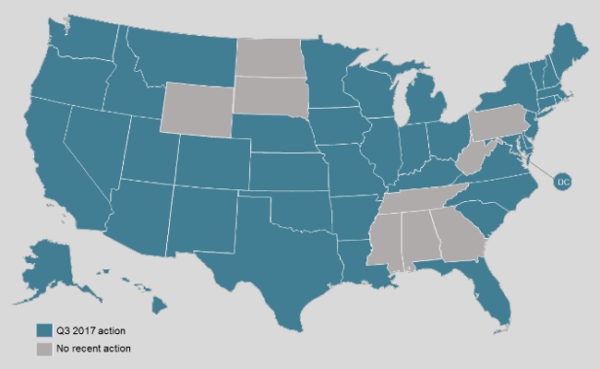This was only exceeded in the fourth quarter of 2016, when 49 actions were taken in 28 states plus Washington D.C., and such proposals have consistently been the most popular policy actions affecting solar tracked by NCCETC in its quarterly 50 States of Solar report.
As reported in the Q3 2017 50 States report, the success rate remains the same. Most of the time regulators grant part but not all of the increases that utilities are requesting, resulting in a slow growth in the national level of fixed charges and minimum bills. NCCETC notes that only one utility in the nation was granted its full requested increase, a modest increase in a fixed charge from US$7 to US$9 for customers of Superior Power and Light in Wisconsin.
Higher fixed charges and minimum bills are generally opposed not only by the solar industry, as they weaken the value proposition of distributed solar, but also by ratepayer advocates, as they lessen the economic benefits of energy efficiency and can increase bills for low-income customers.
Community solar marches on
But as the utility battle with distributed solar companies, and increasingly their own customers, continues, policies around community solar are also on the rise. “It’s been slow and steady, with around one state per quarter adopting a new community solar program,” NCCETC Manager of Policy Research Autumn Proudlove told pv magazine.
This quarter Illinois took the leading action, with the Illinois Power Agency publishing details of a community solar program in its long-term renewable procurement plan. Also, earlier this month Commonwealth Edison’s community solar tariff was approved by state regulators. However, as Illinois-based pv magazine USA contributor Mark Burger has noted, there are still a lot of details that have not yet been worked out regarding community solar in the state.
Part of the complexity is that as community solar spreads across the nation, each state is taking a different approach to how to credit customers. NCCETC notes that some of the unique approaches to credit structures it is seeing are crediting at avoided cost and adopting adders for low-income participants.









By submitting this form you agree to pv magazine using your data for the purposes of publishing your comment.
Your personal data will only be disclosed or otherwise transmitted to third parties for the purposes of spam filtering or if this is necessary for technical maintenance of the website. Any other transfer to third parties will not take place unless this is justified on the basis of applicable data protection regulations or if pv magazine is legally obliged to do so.
You may revoke this consent at any time with effect for the future, in which case your personal data will be deleted immediately. Otherwise, your data will be deleted if pv magazine has processed your request or the purpose of data storage is fulfilled.
Further information on data privacy can be found in our Data Protection Policy.